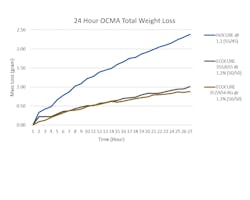Exceeding Standards, Gaining Advantage with PUCB Chemistry
Q: Are there phenolic urethane cold-box technologies (PUCB) that will help our business to be more sustainable — but also enhance our working environment?
A: For a long time, U.S. foundries have benefited from environmental regulations that are less strict than those enforced in Europe. Keeping your business ahead of evolving emissions regulations shows more than social responsibility: It can save operating costs, and avoid fines.
In the European Union, CLP (“Classification, Labeling and Packaging”) Regulations require cold-box resins systems (e.g., ISOCURE) to be classified as dangerous goods on material safety data sheets (SDS) due to regulated phenol and formaldehyde levels. Currently, these standards are not implemented in the United States.
Nevertheless, the trend toward environmentally friendly and sustainable solutions is not slowing down. Moreover, domestic metalcasters should understand that EU regulations – although often more stringent than our own – tend to set the bar globally.
For instance, in 2019 OSHA implemented a new rule on crystalline silica, cutting the permissible exposure limit (PEL) in half from 100 µg (micrograms)/m3 to 50 µg/m3. Although this latter OSHA restriction does not compare to EU phenol and formaldehyde limitations, it signal U.S. foundries to prepare for regulatory standards that reflect a more environmental/sustainable standard than what has been understood.
ASK Chemicals believes not only in advancing environmentally conscious products, but also in offering customers capabilities that are one-step-ahead of prevailing standards.
For this reason, ASK has developed ECOCURE™ BLUE, the world’s first Cold Box Part 1 formulation that is not classified as a hazardous material, based on CLP Regulations. This latest cold-box resin technology also matches the speed and strength found in the ISOCURE family.
This is significant, because a performance trade-off is often unavoidable with environmentally friendly alternatives to current-standard products. ASK Chemicals explains that the comparable “speed and strength” of ECOCURE™ BLUE is accomplished by adjusting the solvents and additives within the binder, while also changing the chemistry backbone to produce the new, environmentally friendly features.
Concerning foundry emissions for PUCB binders, there are two primary causes:
(1) The decomposition processes during pouring, cooling, and de-coring; and
(2) evaporations in the core shop.
ECOCURE™ BLUE has the lowest available level of volatile organic compounds and can be considered as VOC-free, according to EU regulations. And, the new technology contains less than 1% free phenol and non-detectable free formaldehyde, which makes it the cold-box system with the least emissions in the core shop.
During pouring, cooling, and shakeout, there are basically are two kinds of emissions: BTX and phenol emissions. The BTX emissions are more likely to stem from the polyurethane pyrolysis than from the solvent package of the binder. Therefore, these BTX emissions can only be significantly lowered by reducing the binder quantity and increasing the binder efficiency, as the ECOCURE™ binders do. With less free phenol, the ECOCURE™ BLUE enables the phenol emissions to be drastically reduced during pouring.
ASK also has adapted the ECOCURE™ line to accommodate other important health concerns. For instance, ECOCURE 359/659 RS has been developed to reduce smoke and improve “fence-line” issues.
The reduction in smoke promises also to improve working conditions, a major occupational health and safety issue for foundries today. In addition, ASK Chemicals has produced ECOCURE 355/655 and 357/656 RG to offer exceptionally low VOCs and to help foundries meet the Occupational Exposure Limits (OEL) for phenol established by U.S. regulators.
Join the Conversation. Email Your Questions for ASK Chemicals Share your insights, opinions, and elaborate on the questions and the experts' answer(s). You must be logged in to the website in order to post your comments.
